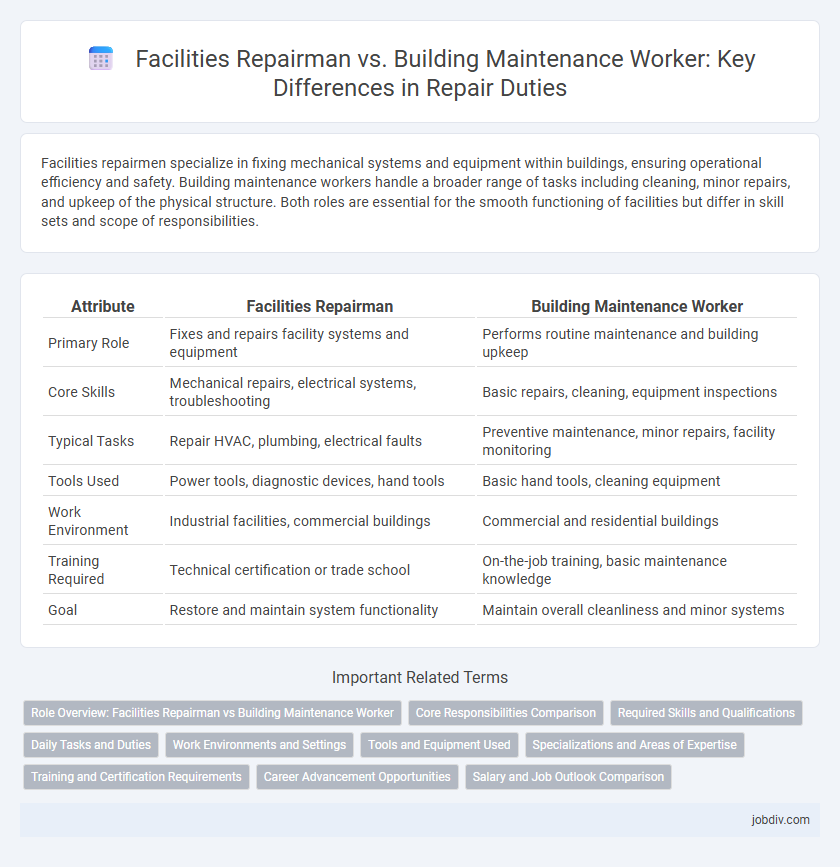Facilities repairmen specialize in fixing mechanical systems and equipment within buildings, ensuring operational efficiency and safety. Building maintenance workers handle a broader range of tasks including cleaning, minor repairs, and upkeep of the physical structure. Both roles are essential for the smooth functioning of facilities but differ in skill sets and scope of responsibilities.
Table of Comparison
| Attribute | Facilities Repairman | Building Maintenance Worker |
|---|---|---|
| Primary Role | Fixes and repairs facility systems and equipment | Performs routine maintenance and building upkeep |
| Core Skills | Mechanical repairs, electrical systems, troubleshooting | Basic repairs, cleaning, equipment inspections |
| Typical Tasks | Repair HVAC, plumbing, electrical faults | Preventive maintenance, minor repairs, facility monitoring |
| Tools Used | Power tools, diagnostic devices, hand tools | Basic hand tools, cleaning equipment |
| Work Environment | Industrial facilities, commercial buildings | Commercial and residential buildings |
| Training Required | Technical certification or trade school | On-the-job training, basic maintenance knowledge |
| Goal | Restore and maintain system functionality | Maintain overall cleanliness and minor systems |
Role Overview: Facilities Repairman vs Building Maintenance Worker
Facilities Repairmen specialize in diagnosing and fixing mechanical, electrical, and structural issues within commercial or industrial buildings, ensuring operational efficiency and safety. Building Maintenance Workers perform routine upkeep tasks such as cleaning, minor repairs, and preventive maintenance to preserve building functionality and appearance. Both roles contribute to facility management but differ in scope, with repairmen focusing on complex technical repairs and maintenance workers handling general maintenance duties.
Core Responsibilities Comparison
Facilities Repairmen specialize in troubleshooting and fixing mechanical systems, electrical components, and plumbing issues to ensure operational efficiency. Building Maintenance Workers handle routine inspections, preventive maintenance, and minor repairs across HVAC systems, lighting, and structural elements. Both roles require technical skills, but Facilities Repairmen focus more on complex repairs, while Building Maintenance Workers prioritize ongoing upkeep and safety compliance.
Required Skills and Qualifications
Facilities Repairmen require strong technical skills in electrical, plumbing, and HVAC systems, often verified by certifications such as EPA 608 or Journeyman licenses. Building Maintenance Workers need a broader skill set including carpentry, painting, and preventative maintenance, with qualifications typically consisting of a high school diploma and on-the-job training. Both roles demand problem-solving abilities and physical stamina, but Facilities Repairmen usually have more specialized training aligned with complex repair tasks.
Daily Tasks and Duties
Facilities Repairmen specialize in troubleshooting and fixing mechanical systems such as HVAC units, electrical wiring, and plumbing to ensure operational efficiency. Building Maintenance Workers conduct routine inspections, perform preventive maintenance, and address general upkeep tasks like painting, cleaning, and minor repairs. Both roles require hands-on skills and knowledge of safety protocols but differ in scope, with repairmen focusing on specialized equipment and maintenance workers managing overall building conditions.
Work Environments and Settings
Facilities repairmen typically work in industrial plants, manufacturing facilities, and large commercial buildings where they focus on machinery and equipment repairs, often in noisy and physically demanding environments. Building maintenance workers operate in diverse settings such as apartment complexes, office buildings, and schools, performing routine upkeep and minor repairs in indoor and outdoor spaces that emphasize occupant comfort and safety. Both roles require adaptability to variable work conditions but differ in the technical complexity and scale of their repair tasks.
Tools and Equipment Used
Facilities repairmen primarily use specialized diagnostic tools such as multimeters, pipe wrenches, and power drills to address complex mechanical and electrical issues within industrial settings. Building maintenance workers rely on more general equipment including hand tools like hammers, screwdrivers, and basic plumbing or painting supplies to perform routine upkeep and minor repairs. Both roles require knowledge of safety equipment like gloves and goggles, but facilities repairmen often engage with advanced machinery requiring technical proficiency in tool operation.
Specializations and Areas of Expertise
Facilities Repairmen specialize in servicing and repairing mechanical systems, electrical components, and HVAC units within commercial and industrial settings, often focusing on troubleshooting complex equipment malfunctions. Building Maintenance Workers possess a broader skill set encompassing routine upkeep, janitorial tasks, and minor repairs in residential or commercial buildings, emphasizing general maintenance and cleanliness. The distinct specialization of Facilities Repairmen lies in technical repairs and system diagnostics, while Building Maintenance Workers prioritize overall building functionality and aesthetic upkeep.
Training and Certification Requirements
Facilities repairmen typically require specialized technical training and certifications in areas such as HVAC systems, electrical work, and plumbing to handle complex repairs safely and efficiently. Building maintenance workers often receive more general training focused on routine upkeep and may hold basic certifications like OSHA safety or first aid. Certification requirements for facilities repairmen are usually more rigorous and specific, ensuring expertise in advanced repair techniques and compliance with industry standards.
Career Advancement Opportunities
Facilities Repairmen often have specialized skills in mechanical and electrical systems, opening pathways to advanced technical roles such as HVAC technician or industrial maintenance supervisor. Building Maintenance Workers typically gain broad hands-on experience that can lead to supervisory positions or roles in property management and facilities coordination. Career advancement for both roles benefits from certifications in safety standards, equipment handling, and project management.
Salary and Job Outlook Comparison
Facilities repairmen typically earn a median annual salary of around $45,000, while building maintenance workers average slightly lower at about $40,000. The job outlook for facilities repairmen projects a growth rate of 5% over the next decade, reflecting steady demand for specialized repair skills. In contrast, building maintenance workers face a 3% growth rate, driven by ongoing needs for routine upkeep and preventive maintenance across commercial and residential properties.
Facilities Repairman vs Building Maintenance Worker Infographic

 jobdiv.com
jobdiv.com